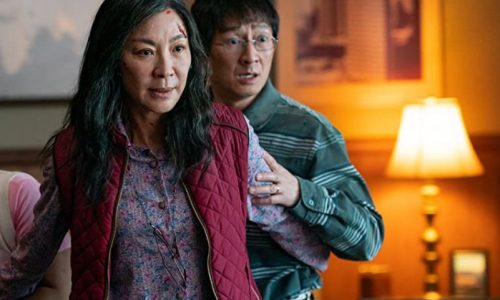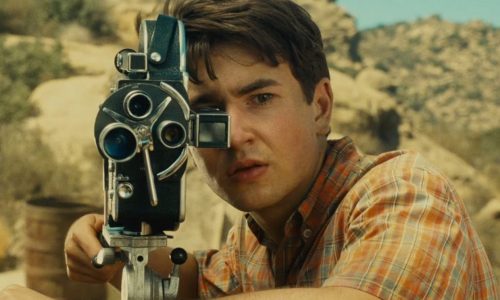Whether or not this year’s Oscars elevated ratings are enough to equate a Hollywood comeback story for the beleaguered telecast, reports seem to suggest Tinsel Town’s biggest night delivered handedly with emotion and a better mix of entertainment.

Sunday’s broadcast averaged 18.7 million viewers according to time zone-adjusted fast national ratings from Nielsen, numbers that include “out-of-home” viewing and are subject to change. Still, that’s a 13 percent improvement from last year with the show drawing the largest audience for any awards show since the 2020 Academy Awards.
“This year’s telecast gives a glimpse into what the Oscars moving forward are going to look like with an eclectic mix of talent, comedy, musical numbers and a blend of old and new school Academy Awards tropes,” said Paul Dergarabedian, senior media analyst for Comscore. “While still maintaining the spirit of what the awards are meant to represent, this year’s Oscars at least attempted to put a slightly new spin on a show that has been clearly in need of a reboot.”
Dergarabedian’s comments come after many analysts and critics expected more viewers for the venerable awards show in its 95th year, which has sunk in popularity in recent years. The combination this year of buzz surrounding Best Picture-nominated blockbusters (Avatar: The Way of Water, Top Gun: Maverick) along with curiosity about how host Jimmy Kimmel might incorporate last year’s slap spectacle by lead actor winner Will Smith of presenter Chris Rock into his monologue, meant a larger audience was anticipated.
Indelibly – and for some – surprisingly, this year’s show ended up featuring its share of special and even light-hearted moments. That’s as the comedy drama Everything Everywhere All at Once was the big winner of the night.
Ke Huy Quan, first seen as Indiana Jones’ sidekick Short Round in The Temple of Doom and last seen in 1992’s quirky teen comedy Encino Man, won Supporting Actor for his comeback role in Everything Everywhere All at Once on Sunday, humbly thanking the love of his life, his wife, for never letting him give up.
“I spent a year in a refugee camp and somehow I ended up here on Hollywood’s biggest stage,” said Quan through tears. “They say stories like this only happen in the movies. I cannot believe it’s happening to me. This, this is the American dream.”

Likewise, his Encino Man co-star from all those years back, Brendan Fraser, walked away with an Academy Award, winning Best Actor for The Whale, also making what many described as a career comeback.
That’s while Jamie Lee Curtis won her first Academy Award for Best Supporting Actress for her role in Everything Everywhere All at Once at age 64. At the end of her speech, she mentioned her Hollywood Royalty, Tony Curtis and Janet Leigh, neither of whom managed to win an Oscar, despite being nominated.
Michelle Yeoh ended up becoming the first Asian American to win Best Actress for Everything Everywhere All at Once – that film scooping three of the four acting awards.
“This is proof that dreams, dream big and dreams do come true. And ladies, don’t let anybody tell you you’re ever past your prime,” said he 60-year old Yeoh.
Still, many disenfranchised viewers citing previous preachy telecasts and politically driven acceptance speeches missed these moments. Compare that to a time in years past when viewers dared not leave their television set for fear of missing a star-studded or in some way significant moment. In some households, the anticipation for the awards show was up there with the excitement behind the arrival of Christmas morning.
When queried prior to Sunday’s show, a random set of previous Oscars viewers said they wouldn’t be tuning in due to “the spewing of political/activist views” that had become prevalent during the broadcast.
As one previous Oscars watcher put it, “When it became a forum for political agendas, it ruined it for me. So much so that I rarely am interested in the movies themselves” while another called it “another woke leftist pat on the back for entitled multi-millionaire egos who tell us how we should live …”
In terms of Kimmel’s hosting duties, Christian Toto, host of the right-leaning Hollywood in Toto Podcast, wasn’t too enthusiastic going into Sunday night but others found the choice fine.
“He’s a competent comic, but no one’s idea of a great talent. His past two hosting appearances weren’t memorable, so what’s new to look forward to?” said Toto. “He’s aggressively partisan, so any chance of luring right-leaning viewers back to the showcase is all but dead this year.”
Dergarabedian, however, said that having a late night show host was a suitable choice and again noted this year’s expected higher ratings were more related to the movies and the performances honoured.
In the end, Kimmel’s opening monologue and performance proved popular, according to many post-Oscar ceremony reports.
Mentioning the night’s nominated actors Fraser and Quan, he joked, “What an incredible night this must be for you two actors and what a disappointing night for Pauly Shore,” referencing their Encino Man co-star.
“Five actors from Ireland were nominated, which means the odds of another fight onstage went way up,” he quipped.

He also noted Steven Spielberg as the first person to be nominated for Best Director in six different decades – this year for The Fabelmans – and 91 year-old composer John Williams as the oldest nominee in Oscar history.
“John turned 91 years old and he’s still scoring if you know what I mean,” joked Kimmel.
For his part, Dergarabedian put into perspective last year’s “slap heard ‘round the world” by pointing out that the Oscars’ controversial moments actually go way back. Think 1973 when Marlon Brando refused to accept Best Actor for playing Vito Corleone in The Godfather in protest of Hollywood’s portrayal of American Indians or 1974 when streaker Robert Opel made an appearance during host David Niven’s speech about the Best Picture category. More recently in 2017, due to a so-called “envelope mix-up,” the film La La Land was announced as best picture before one of the film’s producers had to announce there had been a mistake and Moonlight was actually the winner.
And in terms of changes in the future? Last week there were media reports that the Academy may be getting rid of gender categories.
Toto said he doesn’t see the Oscars going that route – at least not yet. “There’s legit fear that too many men will end up being nominated and/or winning, and the classic way lets studios advertise for twice as many nominees,” he explained, noting however that pressure campaigns behind the scenes may change this.
“I’m betting it will stick to tradition for at least another year or two,” he said.
